UBC Med 2018 Visits Nepal
By the UBC GHI Nepal Sickle Cell Team Situated on the opposite side of the globe, Nepal is a fascinating country full of history, diverse cultures, and spectacular landscapes. This summer, a group of 12 UBC medical students traveled to the western province of Dang in rural Nepal. Partnering with the non-profit organizations, Creating […]
Zimbabwe – Canada Health Initiative
Dr. Ray Markham and his multidisciplinary team have reached the mid point of their trip and works in Zimbabwe. He has provided us with an update on what they have experienced. Read his latest post on March 26th, 2015.
"Well we have reached the mid point! We deliberately set this as a long weekend for members of the team to have the opportunity to explore a little of this beautiful country's culture and scenery..."
Zimbabwe Roots
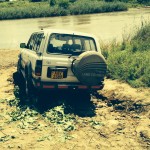 Post #5: Nothing Clinical This Trip……..Right! The trip is over. Our int...
Post #5: Nothing Clinical This Trip……..Right! The trip is over. Our int...
Adventures in Nepal
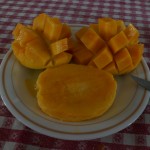 This past summer, I visited Kathmandu, Nepal, for several weeks with a team of medical students through Health Trek Nepal. The program was a cultural exchange with medical students at the Patan Academy of Health Sciences (PAHS) in Kathmandu.
This trip was an especially memorable experience because it allowed me to be in one place long enough to experience day-to-day life. We became familiar with our surroundings, got to know our community, and were able to enjoy the little moments. I contrasted this with the back-packing trip to Europe I also did this summer, where we were on-the-go every few days.
This past summer, I visited Kathmandu, Nepal, for several weeks with a team of medical students through Health Trek Nepal. The program was a cultural exchange with medical students at the Patan Academy of Health Sciences (PAHS) in Kathmandu.
This trip was an especially memorable experience because it allowed me to be in one place long enough to experience day-to-day life. We became familiar with our surroundings, got to know our community, and were able to enjoy the little moments. I contrasted this with the back-packing trip to Europe I also did this summer, where we were on-the-go every few days.
My Experiences with GHI Project Kenya
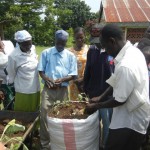 This past summer, I had the privilege of travelling to Kenya to work with Partners in Community Transformation (PCT), a local NGO in Kit Mikayi (a small village in Kenya). I went with three other medical students for one month, during which we initiated and monitored several projects, and educated the community on various topics. Our overall goal as a GHI team was to implement projects that matched the community’s needs and desires, while also addressing several vital social determinants of health – nutrition, income and education.
This past summer, I had the privilege of travelling to Kenya to work with Partners in Community Transformation (PCT), a local NGO in Kit Mikayi (a small village in Kenya). I went with three other medical students for one month, during which we initiated and monitored several projects, and educated the community on various topics. Our overall goal as a GHI team was to implement projects that matched the community’s needs and desires, while also addressing several vital social determinants of health – nutrition, income and education.
Medicina Amazonica: Tales from a medical student in the Peruvian Amazon
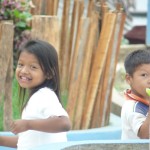 Erik is a 4th Year medical student at McGill University. He is doing an elective in the UBC St. Clotilde, Peru elective and shares his experience in his blogpost. So here's the deal: I'm not much of a writer. I plan to take as many photos as possible over the next month, and I'll use the most interesting ones to share my story with all of you. As internet access is intermittent in Santa Clotilde, I'll post updates as often as possible. Thanks for reading, and stay tuned for updates!
Erik is a 4th Year medical student at McGill University. He is doing an elective in the UBC St. Clotilde, Peru elective and shares his experience in his blogpost. So here's the deal: I'm not much of a writer. I plan to take as many photos as possible over the next month, and I'll use the most interesting ones to share my story with all of you. As internet access is intermittent in Santa Clotilde, I'll post updates as often as possible. Thanks for reading, and stay tuned for updates!
“La Medicina es Bonita” – Reflections on Cuban Healthcare
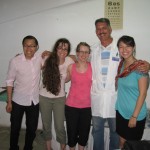 Sweat trickling down our backs and crammed into the few available seats in a Cuban doctor’s office, we struggled to follow our preceptor’s rapid and enthusiastic Spanish monologue. It was a typical hot, humid Cuban afternoon, and as much as we wanted to learn from Ania (the doctor), we struggled against the exhaustive heat and the difficulty of understanding her fast and impassioned speech. It was in the middle of this uncomfortable, sticky session, when the conversation turned to the payment of Cuban physicians, that she slowed enough for us to pick out a few words we would never forget: “La medicina es bonita” (“medicine is beautiful”). We all looked at one another in a (rare) moment of complete and mutual understanding.
Sweat trickling down our backs and crammed into the few available seats in a Cuban doctor’s office, we struggled to follow our preceptor’s rapid and enthusiastic Spanish monologue. It was a typical hot, humid Cuban afternoon, and as much as we wanted to learn from Ania (the doctor), we struggled against the exhaustive heat and the difficulty of understanding her fast and impassioned speech. It was in the middle of this uncomfortable, sticky session, when the conversation turned to the payment of Cuban physicians, that she slowed enough for us to pick out a few words we would never forget: “La medicina es bonita” (“medicine is beautiful”). We all looked at one another in a (rare) moment of complete and mutual understanding.
Reflections on the Cuban Health Care System
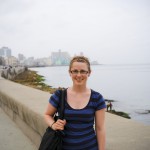 White sand beaches, classic cars, and salsa dancing are all images typically associated with Cuba. Perhaps more notable, however, are the things that are uniquely absent from the country. For instance, there is not a single “American” chain such as McDonalds or 7-11, and the sparsely located internet is slow and very expensive. There are countless other features of Cuba that make it different from any other country.
White sand beaches, classic cars, and salsa dancing are all images typically associated with Cuba. Perhaps more notable, however, are the things that are uniquely absent from the country. For instance, there is not a single “American” chain such as McDonalds or 7-11, and the sparsely located internet is slow and very expensive. There are countless other features of Cuba that make it different from any other country.